After writing that review of Practically Perfect in Every Way, I decided to revisit my old post on Singaporeans and Nonfiction. This post was originally posted on Dayre on 16 Jan 2017 and it has been edited and updated with 2018 information.
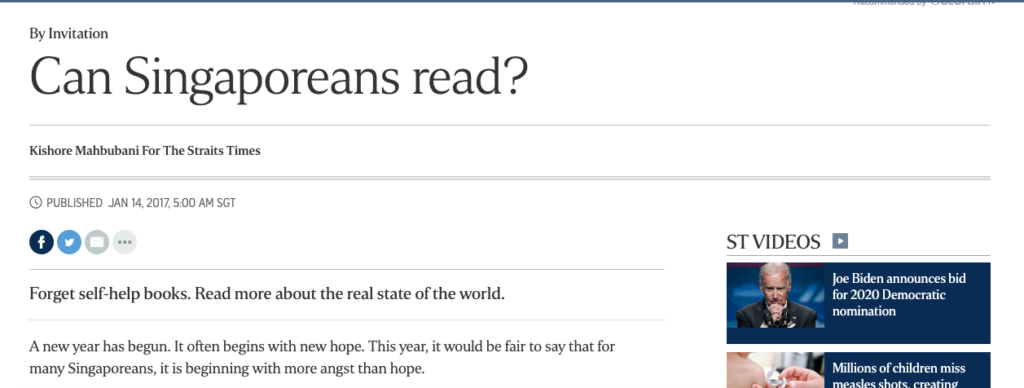
On Saturday, I saw this article in The Straits Times. I have so many things I want to say about it, starting from the headline (and I will, later), but first, I want to talk about the following claims made in the article:
First, that our non-fiction bestseller list is ‘shameful’ because we read too much self-help
Second, that they are full of embarrassing titles.
I don’t know why, but I was intrigued by the statement, so I went to verify it. Basically, I took data from 2016 and the first week of 2017 about best selling nonfiction titles and summarised them.
Each book was assigned genre by going to Goodreads, reading the book description, and seeing which “shelves” the book has been assigned. Normally, there’s one main genre, but in certain cases like Elon Musk, a book could be shelved as Technology or Biography, so I made the genre that was shelved more times as the primary genre.
By the way, something is off with the Strait’s Times site so I only ended up with 50 weeks worth of bestsellers, but I think 500 data points should be enough.
Singapore’s 2016 Bestselling Nonfiction Books
First up, let’s look at the most popular books. In this case, I defined popular books in terms of staying power (i.e. How many weeks they stayed on the Best Seller list). These are books that have been in high demand for a long time. There are a total of 42 books who made it over the course of a year and a week.
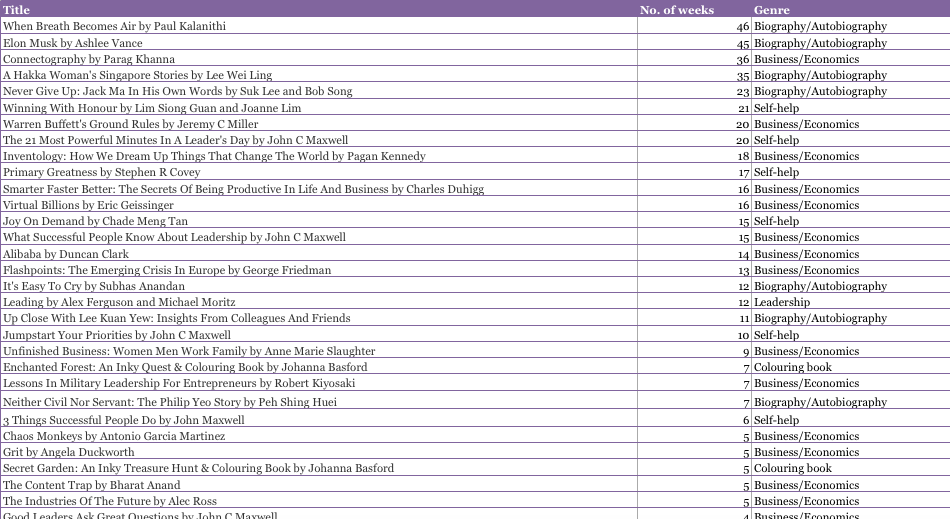
The top 10 books are:
- When Breath Becomes Air by Paul Kalanithi (46 weeks) – Biography/Autobiography
- Elon Musk by Ashlee Vance (45 weeks) – Biography/Autobiography, also can be filed under Technology
- Connectography by Parag Khanna (36 weeks) – Business/Economics
- A Hakka Woman’s Singapore Stories by Lee Wei Ling (35 weeks) – Biography/Autobiography
- Never Give Up: Jack Ma In His Own Words by Suk Lee and Bob Song (23 weeks) – Biography/Autobiography
- Winning With Honour by Lim Siong Guan and Joanne Lim (21 weeks) – Self-help
- Warren Buffett’s Ground Rules by Jeremy C Miller (20 weeks) – Business/Economics
- The 21 Most Powerful Minutes In A Leader’s Day by John C Maxwell (20 weeks) – Self-help
- Inventology: How We Dream Up Things That Change The World by Pagan Kennedy (18 weeks) – Business/Economics
- Primary Greatness by Stephen R Covey (17 weeks) – Self-help
Out of these 10 books, 4 are biographies/autobiographies, 3 are on business/economics and only 3 are on self-help. If we’re looking at the top 5 books, self-help isn’t even included.
Clearly, Singaporeans are not drowning themselves in self-help books. But I was on a roll at this stage, so here’s the breakdown of books by genre (I included both the main and secondary genre because you never know why someone reads a book):
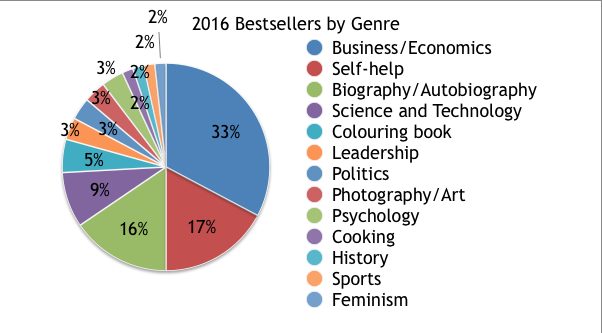
Business/economics related books are the largest genre at 33%. Self-help is the second at 17%, but it wins only by 1 percentage point to biography/autobiography which is 16% of the list. And as the top 10 books showed, biography/autobiography has a lot more staying power.
Looking at this and the rankings, I am reasonably confident in saying that no, Singaporeans do not indulge in self-help books. In fact, they have an interest learning from others (as seen by the biographies) and learning about the outside world (as seen by books like Connectography: Mapping the Future of Global Civilisation, which spent 36 weeks on the best seller list).
Incidentally, one of the books mentioned in the article is here – Jumpstart your Priorities (the author seems pretty popular too). It’s number 20 and spent 10 weeks on the list. Not bad, but there are quite a few books ahead. Another book that was mentioned, The Money: Master Your Game, only spent 4 weeks on the list, so the book must be very lucky to be able to catch the author’s eye and stick in his brain.
My bigger concern with the list is that some books are staying there for so long that it may impact other books from getting onto the list. It would have been nice to see the list greater variability.
2019 Update: What does the 2017 Data Say?
When I decided to copy this post over to this blog, I thought it would be nice to update the article to see if anything had changed. Who knows, I might have be proven wrong when we look at the 2017 data.
Like before, I took the data from The Straits Time’s Bestseller list and compiled it into a list. Initially, I was going to include 2018, but it took me a couple of hours just to finish 2017 and I decided to postpone analysing 2018 until I had more time and/or motivation.
I continued collecting data from the second week of 2017 to the last week of 2018. Unfortunately, The Straits Time’s website does not seem to have improved, because I only found data for 43 weeks. Hopefully, that’s still representative enough for the year. Everything else was the same, although I had to guess the genre only from the description for a few books because there was not enough data on Goodreads. Here are the results:
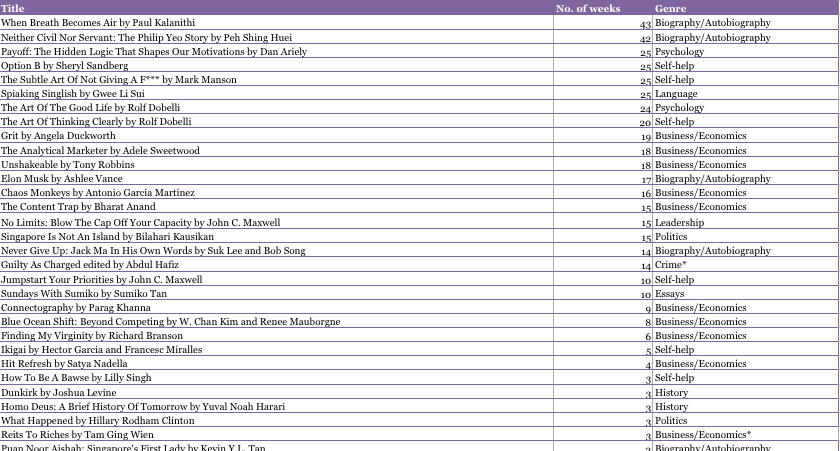
The top 10 books are:
- When Breath Becomes Air by Paul Kalanithi (43 weeks) – Biography/Autobiography
- Neither Civil Nor Servant: The Philip Yeo Story by Peh Shing Huei (42 weeks) – Biography/Autobiography
- Payoff: The Hidden Logic That Shapes Our Motivations by Dan Ariely (25 weeks) – Psychology
- Option B by Sheryl Sandberg (25 weeks) – Self-help
- The Subtle Art Of Not Giving A F*** by Mark Manson (25 weeks) – Self-help
- Spiaking Singlish by Gwee Li Sui (25 weeks) – Language
- The Art Of The Good Life by Rolf Dobelli (24 weeks) – Psychology, also filed under self-help
- The Art Of Thinking Clearly by Rolf Dobelli (20 weeks) – Self-help
- Grit by Angela Duckworth (19 weeks) – Business/Economics
- The Analytical Marketer by Adele Sweetwood (18 weeks) – Business/Economics
Unlike last year, there is a bit more genre variety on the top ten list. Additionally, I think When Breath Becomes Air may be Singapore’s favourite nonfiction book, and I should probably read it sometime. Out of 10 books, 2 are biography/autobiography, 2 are psychology, 3 are self-help, 2 are business/economics, and 1 is language. The number of self-help books are the same as 2016 unless you include secondary genres, in which case, there’s one more book than 2016.
Here’s the breakdown of bestselling books by genre:
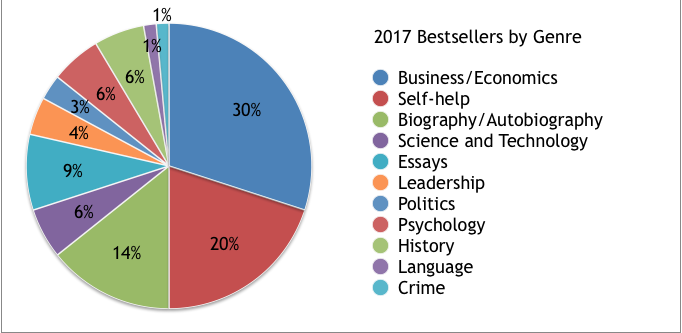
There is a 3% increase in self-help books compared to the previous year, but I don’t think that means that Singaporeans are starting to drown themselves in self-help. I am glad, however, to see that there’s a greater variety of books compared to the previous year. The best-selling books are still very sticky, but we also have more 1-week bestsellers, which could imply greater mobility (in the sense that books make it on the list more easily).
Limitations of the data
The bestsellers list is a “compilation of lists from Books Kinokuniya, MPH, Times and Popular Bookstores”. In order words, it doesn’t factor in library loans or the ebook market. However, I did find this article about library loans: unfortunately, it didn’t differentiate between fiction and nonfiction. But for what it’s worth, 4 of the top 5 books are travel guides. That said, I don’t know how big each of these left-out segments are, but it’s possible that adding them in could switch the top books quite drastically.
Still, if the purchasing trends offline are the same online, and are similar to books being borrowed, then I’m reasonably confident that the conclusions I made will hold.
Thoughts on ‘Can Singaporeans Read by Kishore Mahbubani’
My criticisms start with the title, which may not be very fair if the author didn’t choose it. But it’s one of the rare question-style questions where answering “no” would be a mistake, contrary to the popular belief that if there’s a question, the answer should be no.
Can Singaporeans read?
Obviously. I think our education has given us at least rudimentary reading and writing skills.
The title might be better phrased as ‘Do Singaporeans read?’ but since the author is accusing us of reading too much of one genre, that isn’t really appropriate either.
Perhaps the most accurate (but spoiler-y) title would be “Do Singaporeans read too much self-help books?”
The first section of the article is on the changes in the world. Not much to comment on here.
Then it segues into ‘some people were surprised but not me’ plus a mention of the author’s book. Personally, I don’t think surprise = did not know. They could have read the predictions and just didn’t believe it but whatever.
And then it goes into the section that raised my eyebrows, the ‘Wall of shame’ that is our nonfiction bestseller list (although it seems that he and I are looking at two very different lists).
To be honest, what is the problem with reading self-help? If self-help is what gets someone to start something new, to face a problem, to move to a better place, then bravo for self-help books.
Sometimes, you need to help yourself before you can help the world.
And besides, what is the definition of self-help? There are corny titles*, but what about books like Grit by Angela Duckworth (also on the list) and Peak by Anders Ericsson (didn’t see it on the list but you should read it). Both books could be classified as self-help, but they are based on research and could be used to create programmes that help others.
The author also says that
“(As an aside, I’d like to point out that the New York Times has created a sensible precedent of separating self-help books from the serious books, and I think other papers, including The Sunday Times, should emulate this practice.)”
Personally, I wouldn’t have this as an aside because The New York Times bestseller is not very accurate, at least to me.
This is the list that created the Children’s section in response to Harry Potter, the list that at one time could be bought, the list whose controversies include specific exclusion of books it doesn’t like (like Ted Cruz). The rules are constantly changed (no more multi-author box sets, and too bad for you if most of your fans like to buy from Amazon) and it’s not an unreasonable conclusion that the NYT bestsellers list is not as impartial as one might think.
I mean sure, we could separate the list into thousands of sub-genres, but then what’s the point? Like I said before, what’s so bad about self-help?
People read books for different purposes, and maybe people read self-help because they find something valuable in it that ‘serious’ books don’t have.
And besides, how do we know that these people aren’t reading the latest articles instead of books? Books, especially those published by traditional publishers, have a fairly long lead time.
For example, a book on Industry 4.0 may become obsolete one month after it comes out because the industry is changing rapidly. At least in my personal experience, articles and conversations were far more relevant and easier to get my hands on.
To summarise, there are two problems with this article for me:
1. Casting self-help books as a problem
2. Ignoring the possibility that Singaporeans are getting their information about the outside world from sources other than books.
*2019 Additional Thought on ‘corny’/bad books:
I didn’t think I needed to mention this, but of course not all books in the self-help genre are good. For example, some personal finance book may give bad advice and as Practically Perfect in Every Way showed, it may not even be feasible to implement. That said, there are bad books in all genres and I wouldn’t say that just because there are books with bad advice, it means that the whole self-help genre is doomed.
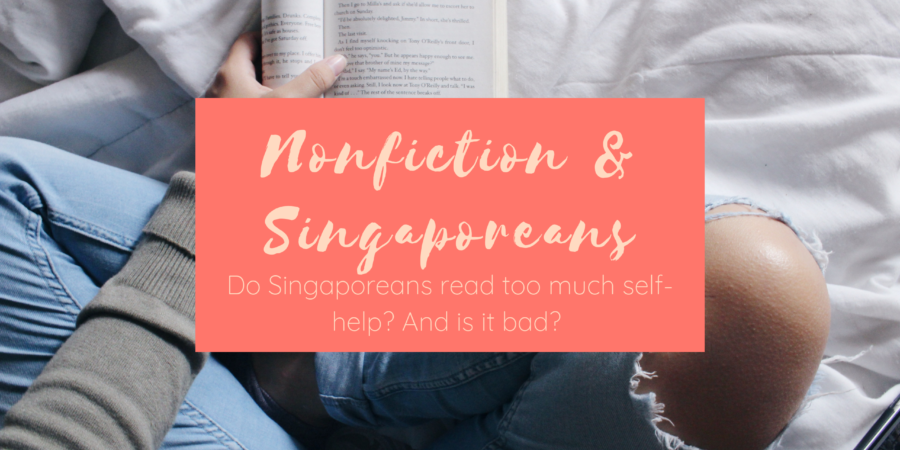
Really interesting and well researched piece! I often have problems with posts that shame readers for their reading choices and I think you did a really thorough job of breaking this assumption down here and challenging the original article. I think it’s wrong to automatically cast self-help books as a problem (even if there can be bad books in the genre- but like you said, there are bad books in every genre)
Thanks! While I understand how everyone has reading preferences, (for eg, I’m not a romance fan), I strongly believe that we have no business disparaging people who don’t share our preference (I won’t go round telling people that romance is somehow inferior to other genres because it isn’t! It’s just that it’s not my cup of tea!)
You’re welcome! I completely get what you mean and really agree- it’s not cool to criticise other people’s tastes, just because we all have different ones.